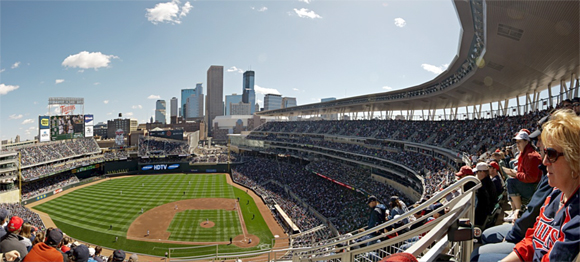
Target Field, home of the Minnesota Twins, generated at least $169.3 million in economic activity in its first year of operation and contributed to a 40 percent rise in liquor-tax revenues.
That’s just a part of the economic impact of the $555-million facility, which also includes $4.8 million in payroll taxes on Twins players in 2011.
In a weird article, the Minneapolis Star Tribune noted the economic impact of Target Field but chose to focus instead on tax revenues being down slightly in 2011 over 2010 and will go down more in 2012. That’s fine, but more than a little slanted: we’re guessing everyone with the county, city, ballpark authority and team expected revenues to go down after the first two years the ballpark opened. To herald it as some sort of unexpected change is a little ignorant of the economics of any large-scale development.
In fact, on every measure there’s been a sea change in tax revenues since the opening of Target Field: restaurant sales taxes up 11 percent over 2007, liquor taxes up 40 percent, etc.
State analysts said downtown liquor tax proceeds were up a staggering 40 percent during the summers of 2010 and 2011 — the ballpark’s first two years — but said they had “no clear understanding” why the numbers had risen so much and that other factors suggested the stadium may be just one of several reasons.
Downtown liquor taxes rose from $1.9 million from May through October 2007, the last summer before the recession, to $2.7 million from May through October in 2010, the ballpark’s first season. The figure was still up 39 percent when comparing the 2007 summer to the ballpark’s second summer in 2011….
“There has to be a lot more going on here than just” a new ballpark, said Paul Wilson, who heads the state’s tax research division.
OK, then; talk about a grudging acknowledgement that the ballpark had a positive impact, as if bringing in 35,000 thirsty fans downtown 81 times a year wouldn’t provide a boost in liquor spending. At the end of the day it’s impossible to ignore the fact that the biggest change in the downtown economic scene in 2010 and 2011 was the opening of Target Field: there were no major housing expansions, no major corporate moves and no other external changes save a general, if very slight, uptick in the local economy.
In the end, it’s easy to look for bad news and deny the economic impact of Target Field. But even those who say they didn’t see an increase in business, like the manager of Lyon’s Pub, admits the area is better off after the ballpark opened.
—-
Share your news with the baseball community. Send it to us at editors@augustpublications.com.
Are you a subscriber to the weekly Ballpark Digest newsletter? You can sign up for a free subscription at the Newsletter Signup Page.
Join Ballpark Digest on Facebook and on Twitter!
Follow Ballpark Digest on Google + and add us to your circles!
